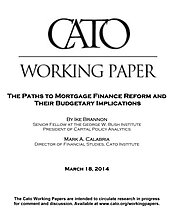The passage of the Housing and Economic Recovery Act in July of 2008 expanded the federal government’s authority to place Fannie Mae and Freddie Mac into conservatorship. As exercised, under the conservatorship the government secured the right to stock warrants worth 79.9% of the company as well as a ten percent dividend on its gross investment. The existing shareholders kept the other 20.1%.
However, the terms of the conservatorship were repeatedly amended. As the two GSEs returned to profitability, the government amended the conservatorship to lay claim to the entire net worth of the two government-sponsored enterprises, which it swept into Treasury’s coffers each quarter. This move effectively froze out the non-government shareholders from any residual profits.
It also allowed the federal government to report sharply lower deficits than would have otherwise been the case. As of 2014 the government had recouped its core $187.5 billion investment in the two and Congress is now contemplating major reforms of the mortgage finance sector.
The current reform plan that has garnered bipartisan support, the one proposed by Senators Tim Johnson and Mike Crapo, would wind down Fannie and Freddie and replace them with new entities. In doing so it would also largely codify the Treasury’s zeroing out of Fannie and Freddie’s private shareholders.
In order to allow the new entities to begin with a fresh balance sheet, the legislation would have the federal government explicitly guarantee the $5.2 trillion of debt of Fannie Mae and Freddie Mac. While a booming economy could gradually reduce that figure with few untoward consequences for the government, if the housing market were to have another swoon, the government would undoubtedly find itself having to cover some portion of this debt.
Explicitly guaranteeing the debt incurred by Fannie Mae and Freddy Mac represents an unprecedented step for the government, and something the Treasury previously went to some lengths to avoid. Such an explicit guarantee is also contrary to long existing statute, which even today denies creditors any right to taxpayer backing. Neither the public assumption of all GSE debt nor the effective confiscation of the private shareholders’ GSE stock send an affirming signal to private investment.
Reform of the U.S. housing market is past due: if we hope to rebuild our mortgage finance system on a foundation of private capital, then property and contractual rights must be respected.


